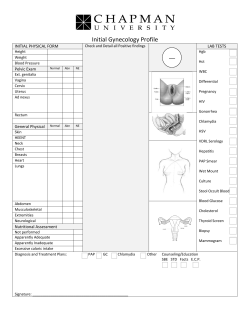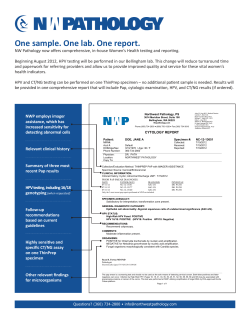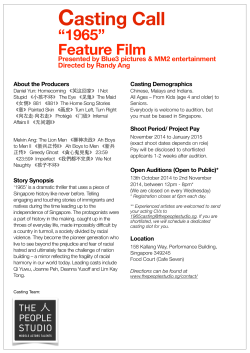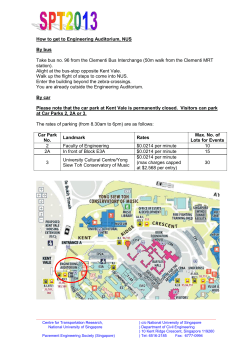
Document 341231
A6 TOP OF THE NEWS TUESDAY, OCTOBER 21, 2014 Can PAP stay dominant? A daunting task, says Ho ‘Freak election’, party split, or defeat by opposition possible scenarios By THAM YUEN-C SINGAPORE’S best days are still ahead of it but, in contemplating its next 50 years, a key question to ponder is whether the ruling party will stay dominant, said leading public intellectual Ho Kwon Ping yesterday. The People’s Action Party (PAP), which has been in uninterrupted power for 56 years, has accomplished two major feats where many others have failed, he said. First, it has produced consistent economic growth with broadbased gains for its entire people, and second – even harder – it has maintained exemplary, transparent governance with an entrenched ethos of incorruptibility. “Its third challenge is not to just remain in power, nor to maintain its one-party dominance and deny the opposition its self-de- scribed role as a ‘co-driver’ of the nation, but to do so in a manner which ensures that the party truly renews itself and retains its original vitality, vibrancy and vigour,” said Mr Ho in the first lecture of the Institute of Policy Studies (IPS)-Nathan lecture series on Singapore’s public policy. But will it be able to do so, asked the businessman as he sketched out three basic possibilities. First, an accidental or freak election that throws out the PAP. Second, a split within the PAP resulting in a loss to an opposition party which might not otherwise be stronger than a united PAP. And third, an anticipated, outright loss to an opposition party. “I would rate the first possibility – a freak election – as having the highest chance, followed by an internal split, and the least like- ly is an outright, widely predicted loss,” he said. In all likelihood, it would be an interplay of these scenarios, he added. While he did not think the PAP would lose its dominance in the next 15 years, it could happen further down the road, he said. Only one other democratically elected ruling party, Mexico’s Institutional Revolutionary Party, had ruled continuously for a longer time than the PAP’s 56 years, said Mr Ho. Pointing out that a change of power can happen only when people believe an opposition party can govern, Mr Ho noted that recent elections had established the credibility of some opposition parties as “serious-minded, competent and constructive”. Mr Ho, who was giving the talk as the first S R Nathan Fellow – a title given to honour the former president’s contributions – predicted that the journey towards socio-political and cultural maturity would define Singapore’s next two decades. In yesterday’s first of five lectures, he said: “In the history of young nations, this is the most precarious period of transition, when new generations who have not the slightest personal memories of or connections to the founding generation, take on the mantle of leadership.” Noting that Singapore was at a “watershed moment in history”, where “economic progress must now be matched by a more holistic maturation in other spheres of life”, Mr Ho urged the younger generation to grasp the nettle and define how society should develop. The one-time rebel and political detainee also said that this evolution would not be tension-free. How the younger generation approached this task would determine if the country was “fated to either decline through thoughtless hubris, or flounder in equally thoughtless self-doubts and anxiety”, he said. yuenc@sph.com.sg 쐽 SEE OPINION A21 ST PHOTO: DESMOND LIM Mr Ho Kwon Ping on the future of the PAP: Political leaders who practise ‘servant leadership’ would be respected NO MATTER how political leaders are chosen, it is how sincerely they treat people that will determine if they have legitimacy, said businessman Ho Kwon Ping yesterday. He said this in response to a question about what defined political legitimacy in Singapore. At a dialogue after delivering his first lecture as part of the Institute of Policy Studies (IPS)-Nathan lecture series, Mr Ho said political leaders who truly practised “servant leadership” would be respected by people. “Legitimacy is when people recognise that the leaders who are there... are doing it for the sake of the people they are supposed to lead... it is conferred upon leaders whom people see are truly acting in their best interest,” he said. During the dialogue, he was also asked about the possibility of a “super freak election”. The session’s moderator, IPS director Janadas Devan, had asked if Mr Ho thought an opposition party could win one election and suddenly find itself the majority in Parliament, controlling as many as the 80 seats that the People’s Action Party (PAP) had now. In response, Mr Ho said such a scenario was unlikely. He added that he did not think any opposition party would want such a situation. “I don’t think the Workers’ Party (WP) itself would like to have a situation where suddenly it has 80 seats in Parliament because it’s probably going to be voted out in subsequent elections,” he said. Currently, the WP has seven elected MPs and two Non-Constituency MPs. He quipped: “I don’t know to what extent this super freak scenario is going to frighten Singaporeans to not vote for (the opposition).” On whether the PAP would accept such an election result if it happened, or there would be an “unprecedented military takeover”, he said he believed the PAP would honour the results. Noting that it “plays by the rules, although it may push it a little bit”, he said: “They would recognise that losing one election and biding time to win again is quite easily achievable, but disallowing the democratic process from proceeding is going to destroy Singapore.” Asked how he thought the PAP would do in the next election, he said that it was hard to tell. But there was a segment of Singaporeans for whom the desire for an alternative voice in Parliament is strong. “I have not met anyone who voiced out that they hope to see a change in government, but I have met people who told me that no matter how much the Government has done, they will still vote opposition because they believe in entrenching an opposition (in Parliament),” he said. THAM YUEN-C Historical trends elsewhere point towards an election loss by the PAP in the second half of the next 50 years. Or to put it another way, it would be extraordinary if that did not happen. On why the PAP could lose an election: There are three basic possibilities: first, an accidental or freak election. Second, a split within the PAP resulting in a loss to an opposition party which might not otherwise be stronger than a united PAP. And third, an anticipated, outright loss to an opposition party... I would rate the first possibility – a freak election – as having the highest chance. On his takeaway for Singapore: First, that 50 years is a long enough time for a people to create wonders and so we should see the next 50 years with an excitement towards what Singapore can yet become, and with a child-like amazement at each unfolding opportunity. And second, that openness, tolerance and diversity, whilst also bringing their own risks, are the essential ingredients for greatness – a goal not beyond our collective grasp. Young’s DIY approach ‘can propel Singapore’s progress’ By NUR ASYIQIN MOHAMAD SALLEH THEIR forefathers helped Singapore make the leap from Third World to First World. Now, it is up to the younger generation to keep the momentum going over the next 50 years, said businessman Ho Kwon Ping. He is, however, hopeful that young Singaporeans, with their boundless optimism, are up to the task. Their sense of self-agency – acting to bring about the change they want – sets them apart from his generation. He said: “What unites them all is the immediacy of self-agency; not waiting around for somebody else to do something you think is needed, but doing it yourself.” Mr Ho made the point when he wrapped up his lecture as an S R Nathan fellow yesterday, passing the baton to the young while calling on them to help the country progress beyond economics. The younger generation’s “do-it-yourself” approach, he said, could spark the return of the “participatory democracy” that thrived in Singapore’s early years before what he described as its surrender to a period of developmental authoritarianism. When it comes to politics, the young are looking towards loftier ideals, like championing civil society causes, he said, pointing to the mass reading event staged this year to protest against the National Library Board’s decision to remove a book with same-sex content. “Whereas in my generation, the Government and the PAP were always the reference point around which all discussion revolved, whether positive or critical, today’s young people seem to be bored by too much purely political discussion,” said Mr Ho. “They want to move on, to talk about: What next?” The young, he added, are not content with a top-down approach, recognising that they have a role to play in building Singapore’s future from the ground up. “They regard the Government and the PAP as a matter of fact – not a saviour, not a tyrant, but somewhat like a parent who is respected but who must be grown out of,” said Mr Ho. “And clearly, a paternalistic political culture is not going to excite, much less retain, the loyalty of younger Singaporeans.” As Singapore changes, politicians across party lines will find the country a greater challenge to govern. Mr Ho identified some key trends that would make it an uphill task, such as the struggle to hold the political centre together in the face of polarising extremes, and social media eroding the Government’s ability to control information. The diminishing status of political leaders will also pose a challenge, he said. “Future leaders simply cannot command sufficient respect and moral authority to decree what is acceptable and unacceptable criticism.” But he cautioned that political power being shared among competing groups could give rise to “non-constructive” politics. A political culture of mutual respect must, therefore, be established to prevent political discourse from descending into “theatrical farces” seen in Hong Kong and Taiwan, he added. In his lecture, Mr Ho also pointed out that the civil service – which has known only “one political master in 50 years” – would need to learn to stand on its own. “With more electoral volatility in the future, it is imperative that the civil service work harder to develop its own sense of self, its own ethos and values,” he said. asyiqins@sph.com.sg It’s a done deal – roast meat joint sold for $4m to conglomerate By EUNICE QUEK Madam Betty Kong with (from left) Aztech Group’s Mr Jeremy Mun and Mr Michael Mun, a long-time Kay Lee customer. The company paid $500,000 more than the original asking price of $3.5 million for the roast meat joint. ST PHOTO: NEO XIAOBIN KAY LEE Roast Meat Joint has been sold for $4 million to conglomerate Aztech Group, 21/2 years after the 32-year-old roast meat institution in Upper Paya Lebar Road was put up for sale. Publicly listed Aztech, with diverse businesses in electronics, LED lighting and marine logistics, paid $500,000 more than the original asking price of $3.5 million. Madam Betty Kong, 68, who owns Kay Lee with her husband Ha Wai Kay, 64, said the price went up because the value of the freehold, 1,313 sq ft shop space had increased. When they first put the premises and recipes up for sale, they received some 70 offers but none of them met the asking price. The shop attracts queues and turns in a four-figure daily profit. She told The Straits Times last night: “They were very sincere and met our asking price. We wanted the name to continue successfully and I will support them. When I’m 90 years old, Kay Lee will still be here.” Mr Jeremy Mun, 39, Aztech’s senior vice-president of marketing, said his father, Mr Michael Mun, 64, the company’s group chief executive, has been a longtime customer. The younger Mr Mun said: “It’s not about making money, it’s about preserving a heritage brand because a lot of good food has disappeared. So we want to extend the life of Kay Lee and also expand the business.” So the company approached the couple in August and the deal was completed on Sept 18. The newly set up Kay Lee Pte Ltd will be a subsidiary of Aztech and it will take over operations on Nov 18. The couple will continue to work at the flagship outlet, but it is not known how long they will stay. Madam Kong, whose two children do not want to continue the business, said: “I will still be there because I have customers who look for me at the stall. If I’m not there, they think the flavour is not the same.” The roast meat business that she and her husband built from scratch will expand beyond their dreams. Aztech plans to open at least 10 casual restaurants under the Kay Lee name, mostly in heartland malls, in the next two years. The first is expected to open early next year . The younger Mr Mun said the company had been looking to expand its food business. “Even in bad times, people still have to eat,” he said. Aztech has a subsidiary called Shiro Corporation, which sells wines and distributes canned and frozen food, but this is its first foray into restaurants. The company has hired chefs to learn how to roast the meat using Guangzhou-style recipes that Mr Ha’s father developed in the 1950s. It will retain Kay Lee’s staff and use its current suppliers. By the end of the year, the company will also open a central kitchen. Mr Mun does not rule out taking the Kay Lee brand to countries in the region and even China. “After all, the recipes technically came from Guangzhou,” he said. euniceq@sph.com.sg
© Copyright 2025














